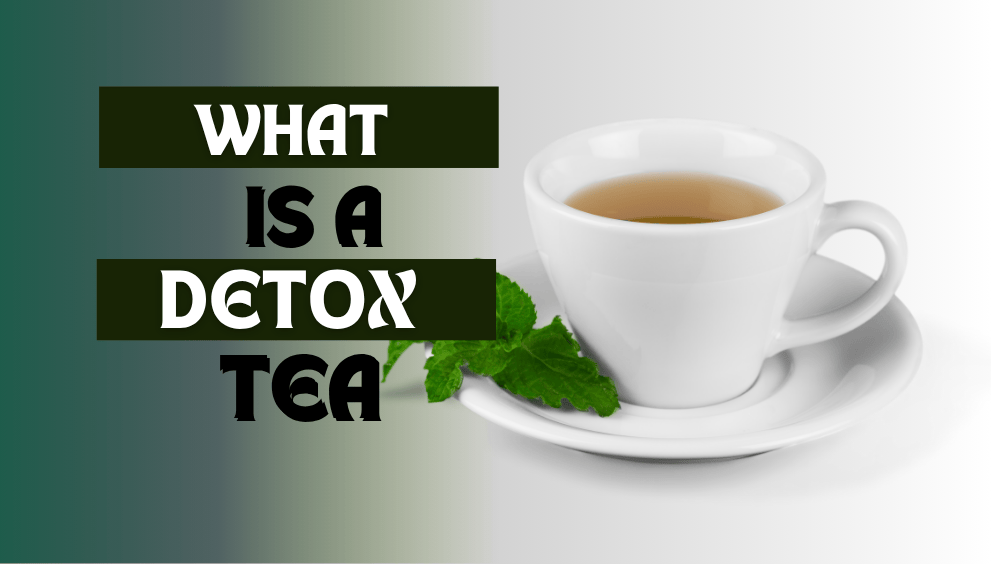Can Detox Tea Help with Weight Loss? Myth or Reality?
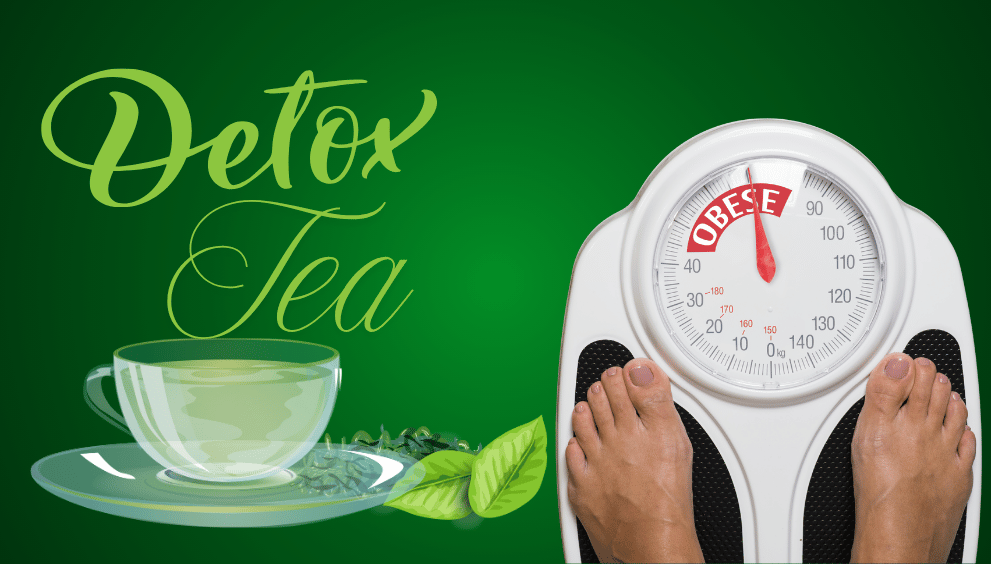
Can detox tea help you lose weight? Discover the science-backed truth about detox teas, their benefits, and potential risks. Learn if they’re worth trying! Detox tea gained popularity as a quick weight loss solution, promising to remove toxins, improve metabolism, and help users lose pounds rapidly. Does detox tea work? It’s a question.
This blend contains green tea, dandelion, and senna, which support digestion and help reduce water retention. Experts debate the long-term effectiveness and safety of these methods. Some detox teas act as laxatives rather than real fat burners. They offer a temporary slimming effect, but proper weight loss, a balanced diet, and exercise are still required. In this article, we’ll explore the science behind detox teas, their potential benefits, risks, and whether they’re worth adding to your wellness routine.
Why do so many people turn to detox teas for weight loss?
The answer lies in our craving for quick fixes; we want to set up everything within a few minutes. We want a promise to remove toxins, melt fat, and boost metabolism with just a few sips. Celebrities advertise them, influencers swear by them, and social media is flooded with dramatic before-and-after results. But behind this hype, do these teas truly deliver long-lasting weight loss, or is it just a temporary illusion? Some blends work as mild diuretics, while others rely on laxatives, now raising questions about their safety and effectiveness. Before you sip your way to a “detox glow,” let’s separate fact from fiction—because real, sustainable weight loss rarely comes in a tea bag.
Can detox tea help you lose weight? Or is it hype?
The Big Question: Can Detox Tea Truly Help You Burn Fat, or Is It Just Clever Marketing? The wellness industry touts detox teas, making bold claims that these herbal blends can melt belly fat, flush toxins, and boost metabolism almost magically. But here’s what matters: Do these teas help burn fat, or are you just paying for placebo-level results—and possibly unpleasant side effects?
Science tells us that while some ingredients (like green tea’s catechins) may mildly support metabolism, most “detox” teas rely on diuretics or laxatives. That means any sudden weight loss is likely due to water loss, not actual fat reduction. Worse still, overuse can have adverse effects, disrupting digestion and electrolyte balance. So before you trust a trendy tea tagline, let’s dissect:
- What’s really in your detox tea?
- Does the weight loss last, or does it rebound?
- Are there safer, more effective alternatives?
The truth might surprise you and save you time, money, and discomfort.
Science-Backed Answers with Practical Takeaways.
The Truth About Detox Tea and Fat Loss: Science-Backed Answers You Can Use. Let’s cut through the hype: Can detox tea genuinely help you lose fat, or are you just buying into clever marketing? We’re going beyond influencer endorsements to provide you with evidence-based answers and practical takeaways that you can apply today.
Practical Takeaways:
1. If using detox tea, opt for caffeine-free herbal blends, such as peppermint or ginger, for digestive support without the use of laxatives.
2. For real fat loss, pair high-catechin green tea with protein-rich meals to help maintain stable blood sugar levels.
3. Watch for red flags: teas promising “10 lbs in 3 days” or containing senna/aloe latex. Detox teas alone won’t reshape your body, but when used strategically and safely, they can be a small piece of a larger weight-management puzzle. Want a complete breakdown of studies and expert opinions? Keep reading.
3. How Detox Tea Claims to Help with Weight Loss
Detox teas market themselves as miracle workers for weight loss, but how exactly do they deliver on these promises? Here’s the breakdown—and what science says about each claim:
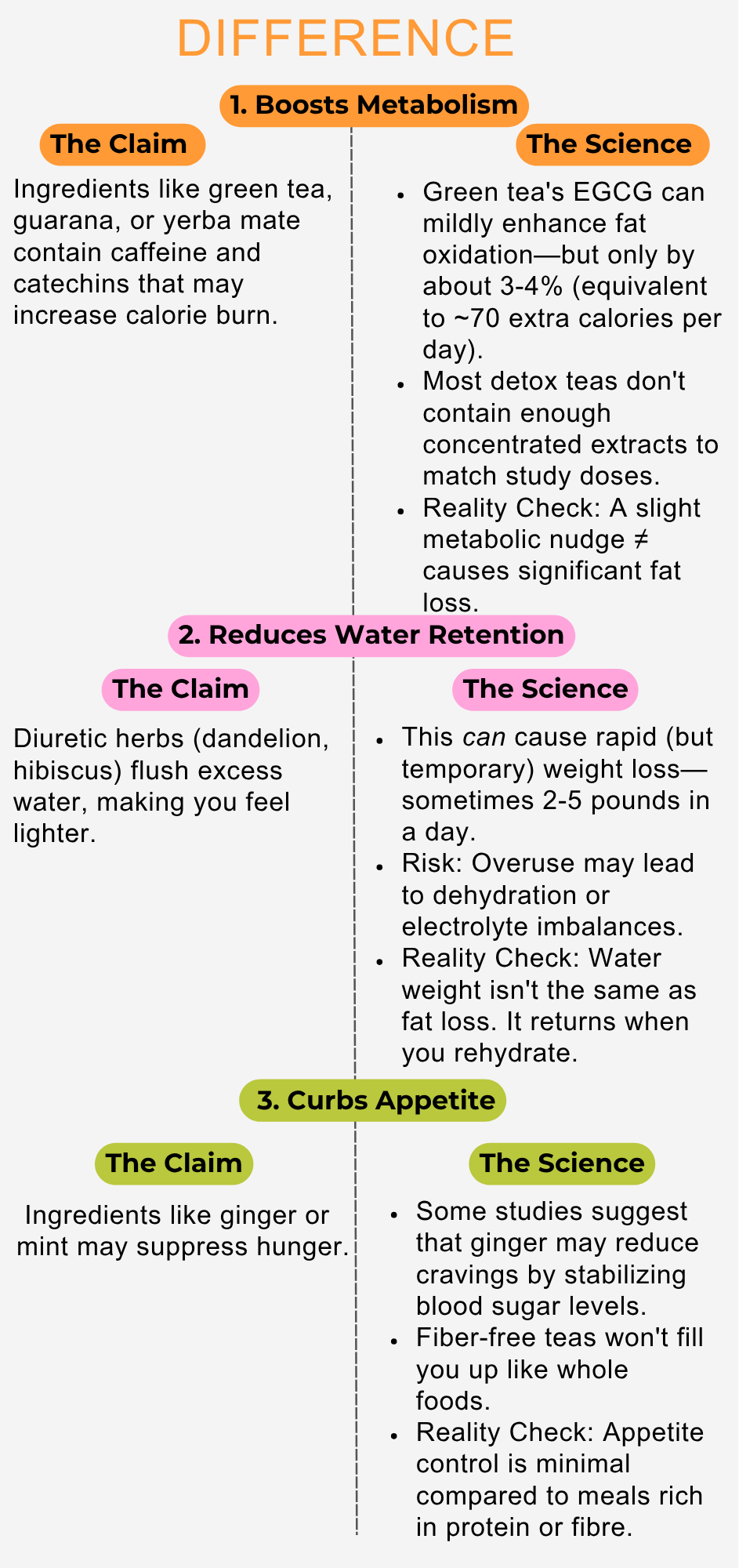
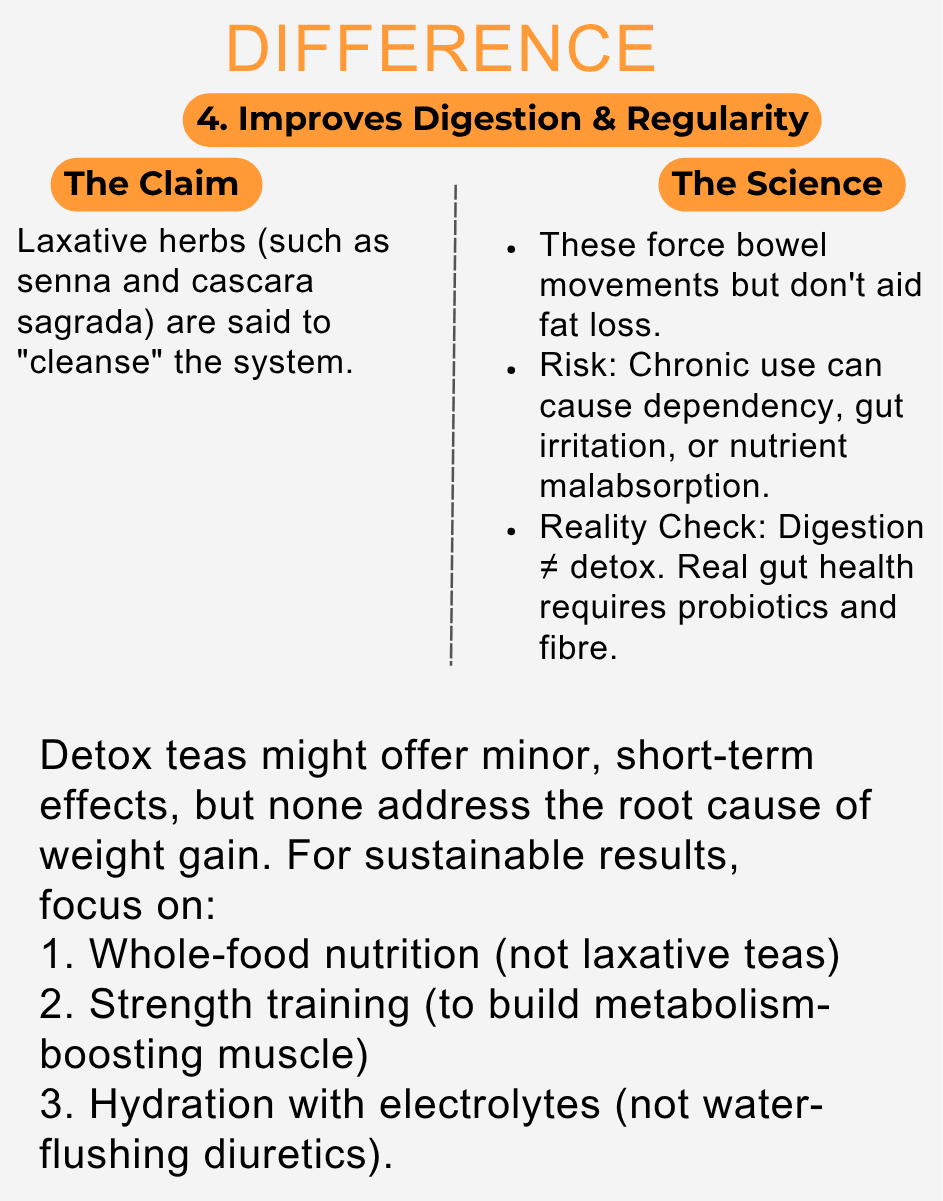
Want a truly compelling alternative? Try swapping detox tea for matcha and lemon water or peppermint tea after meals—gentle alternatives that offer fewer risks.
4. What Science Says About Detox Tea and Weight Loss
Detox teas flood social media with dramatic before-and-after photos, but what does peer-reviewed research say about their effectiveness? Let’s separate proven benefits from marketing hype—and reveal which ingredients (if any) hold weight.
1. Real Research vs. Marketing Claims
The Big Disconnect:
- Marketing Says: “Flushes toxins, melts fat fast!”
- Science Says: There is no clinical evidence that “detox” teas are more effective at removing toxins than the liver and kidneys already are.
What Studies Show About Weight Loss Claims:
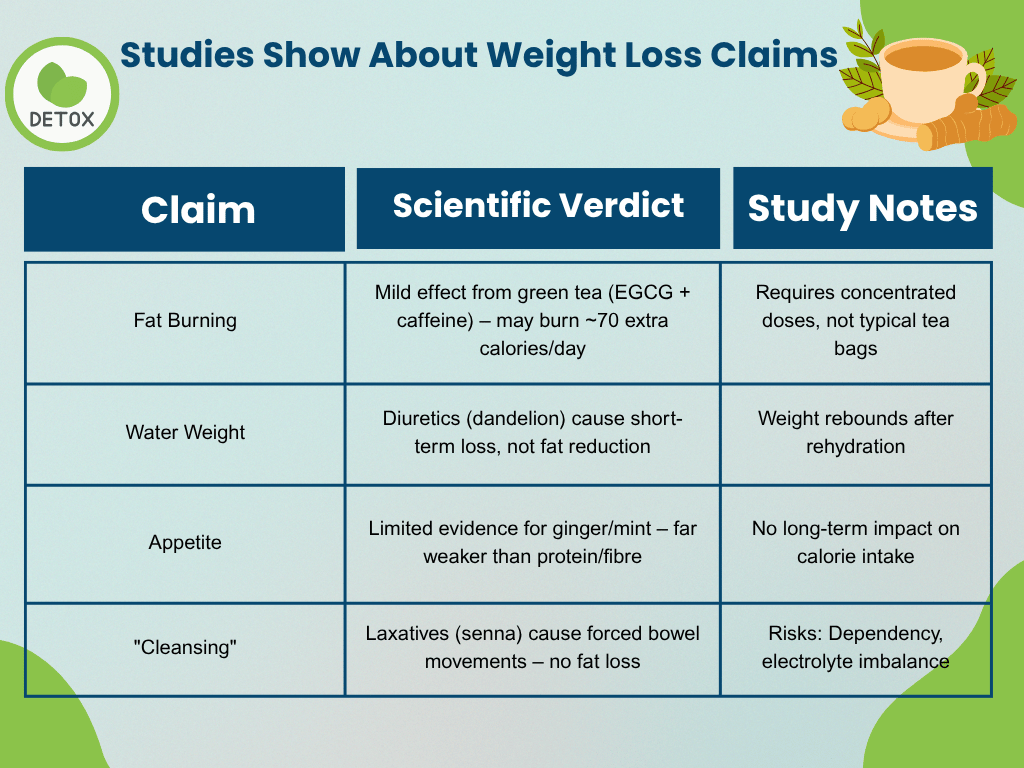
2. Temporary vs. Long-Term Effects
The Reality:
- Short-Term: Water weight loss (2-5 lbs in days) from diuretics/laxatives. This is not fat loss.
- Long-term: No studies have proven that detox teas lead to sustained weight reduction. One trial found that participants regained all the weight they had lost after use.
Hidden Risks
- Chronic senna use can damage gut nerves → lazy colon syndrome.
- Overuse of diuretics can lead to dehydration or a potassium deficiency.
3. Key Ingredients Analysed
A. Green Tea (The Only Semi-Valid One)
- Active Compounds: Catechins (EGCG) + caffeine.
- Proven Effect: Increases fat oxidation by ~3-4% (study in American Journal of Clinical Nutrition).
- Note: You’d need 250–500mg of EGCG daily (approximately 5 cups of high-quality green tea). Most detox teas don’t specify doses.
B. Dandelion (Diuretic)
- Effect: Increases urine output, resulting in temporary water weight loss.
- Risk: Potassium depletion if overused.
C. Senna (Laxative)
- Effect: Forces colon contractions → “cleansing” illusion.
- Risk: Dependency, chronic constipation, malabsorption.
D. Ginger/Mint (Digestion Support)
- Benefit: May soothe bloating/nausea, but has no fat-loss impact.
Detox teas are not a weight-loss solution. At best, green tea offers mild metabolic support; at worst, laxative blends are harmful placebos.
Better Alternatives for Real Results:
- Swap detox tea for plain green tea or matcha (for real EGCG benefits).
- Hydrate with electrolyte water (not dehydrating diuretics).
- Focus on fibre + probiotics for gut health (not laxatives).
5. Potential Benefits of Detox Tea (When Used Properly)
While detox teas aren’t a magic solution for fat loss, they can offer some short-term benefits—if chosen carefully and used in moderation. Here’s what they might help with—and how to maximise the benefits while minimising the risks.
1. Short-Term Water Weight Loss
How It Works:
- It contains mild diuretics (dandelion, hibiscus) →, flushes excess water → temporary slimmer appearance.
- Valid for Occasional bloating (e.g., post-salty meal or travel).
Warning
- Not fat loss – weight rebounds once you rehydrate.
- Don’t overuse – it can lead to dehydration or electrolyte imbalances.
Smart Use Tip:
Try dandelion tea (caffeine-free) before events for bloating relief, but avoid drinking it daily.
2. Improved Digestion & Less Bloating
How It Works:
- Ginger and peppermint teas soothe stomach muscles, easing gas and bloating.
- Some blends include gentle herbs (fennel, chamomile) to calm digestion.
Warning:
- Avoid teas with senna or laxatives—they can worsen bloating in the long term by disrupting gut function.
Smart Use Tip:
- Sip peppermint or ginger tea after meals for natural digestion support—skip the “detox” labelled versions.
3. Increased Awareness of Healthy Habits
Psychological Boost:
- Drinking tea can help create a routine and promote mindfulness (e.g., replacing sugary drinks).
- It may encourage hydration (if caffeine-free) or prompt healthier eating habits.
Warning:
- Not unique to detox tea—any herbal tea can provide this benefit.
Smart Use Tip:
- Use tea time as a trigger for healthy habits (e.g., “I’ll drink chamomile tea and journal instead of nighttime snacking”).
The Takeaway?
Detox teas aren’t metabolic miracles, but they can be occasional tools for:
- Bloating relief (dandelion/peppermint)
- Digestion support (ginger/chamomile)
- Mindful routine-building
Just avoid:
- Daily use
- Laxative-based blends
- Expecting fat loss
6. Side Effects and Risks to Know
Side Effects and Risks of Detox Tea: What You Need to Know
Detox teas may promise quick results, but they come with serious risks, mainly when misused or over a long period. Before sipping, understand these potential dangers:
1. Dehydration
Why It Happens:
- Many detox teas contain diuretics (like dandelion or parsley), which increase urine output.
- Frequent urination flushes out water without replenishing electrolytes.
Symptoms to Watch For:
- Dark urine, dizziness, headaches, dry mouth.
How to Stay Safe:
- Never replace water with detox tea.
- If using diuretic teas, drink electrolyte-rich fluids (coconut water, LMNT) to rehydrate.
2. Electrolyte Imbalance (From Laxatives)
Why It Happens:
- Laxative ingredients (senna, cascara sagrada, aloe latex) force bowel movements by irritating the colon.
- This strips your body of potassium, sodium, and magnesium, critical for heart and muscle function.
Symptoms to Watch For:
- Muscle cramps, fatigue, irregular heartbeat.
How to Stay Safe:
- Avoid teas with senna/aloe latex (check labels!).
- If you experience cramps, try eating bananas and avocados or taking electrolyte supplements.
3. Disrupted Metabolism (If Overused)
Why It Happens:
- Rapid water loss tricks the scale, not fat loss.
- Repeated cycles of dehydration and laxative use can slow your metabolism by overstressing the body.
Long-Term Risks:
- Thyroid dysfunction, hormonal imbalances, and rebound weight gain.
How to Stay Safe:
- Focus on sustainable fat loss (strength training, protein, sleep).
- If using detox tea, limit to 1-2x/month (e.g., post-holiday bloat).
4. Dependence on Tea for Bowel Movements
Why It Happens:
- Laxative teas weaken the colon’s natural contractions over time.
- Your gut becomes “lazy,” relying on stimulants to function.
Symptoms to Watch For:
- Chronic constipation occurs when not using the tea.
How to Stay Safe:
- Never use laxative teas daily.
- For regularity, try fibre (such as psyllium husk), probiotics, and magnesium citrate instead.
Detox teas aren’t harmless, especially those with:
Senna/aloe latex (harsh laxatives)
Excessive diuretics (causing dehydration)
Safer Alternatives for Bloating/Weight Loss:
- Green tea/matcha (mild caffeine + EGCG)
- Peppermint/ginger tea (bloating relief)
- High-fibre foods + water (natural digestion)
If you’ve experienced these side effects, consider tapering off detox teas and supporting gut health with probiotics and electrolytes.
7. Best Practices: How to Use Detox Tea Safely for Weight Loss
Detox teas can be part of a wellness routine—if used strategically and safely. Follow these evidence-based guidelines to minimise risks while maximising potential benefits.
1. Choose the Right Tea
Look For:
- Non-laxative herbal blends (peppermint, ginger, dandelion root, rooibos)
- Caffeine-free options (unless you specifically want green tea for metabolism)
- Organic, additive-free ingredients (avoid “proprietary blends” with hidden laxatives)
Avoid:
- Teas containing senna, cascara sagrada, aloe latex, or rhubarb root (harsh laxatives)
- Products promising “extreme cleansing” or rapid weight loss
2. Never Rely on It as a Quick Fix
Reality Check:
- Detox teas don’t burn fat—they may only help reduce bloating and water weight.
- Crash diets + detox teas = muscle loss + metabolic slowdown.
Smart Approach:
- Use tea as a temporary aid (e.g., post-holiday bloating) —not a long-term solution.
- Pair with fundamental fat-loss strategies (protein-rich meals, strength training, sleep).
3. Combine with Healthy Eating & Exercise
Maximise Results Safely:
- Hydrate well (½ your body weight in oz of water daily).
- Eat fibre and probiotics (which help keep digestion regular without the need for laxatives).
- Move daily (even walking helps lymphatic drainage).
Best Tea Pairings:
- Morning: Green tea (with food to avoid caffeine jitters).
- Evening: Chamomile and peppermint (calms digestion before bed).
4. Strict Time Limits (Avoid Dependence)
Safe Usage Guidelines:
- Maximum: 1 cup/day for 5–7 days max (then take a break).
- Never use daily for weeks—this risks dehydration, electrolyte loss, or laxative Dependence.
When to Stop Immediately:
- Diarrhoea, dizziness, or muscle cramps.
- If bowel movements don’t return to normal after stopping.
5. Listen to Your Body
Watch For:
- Energy crashes, headaches, or irregular heartbeat (signs of electrolyte imbalance).
- Increased bloating after stopping (may indicate gut disruption).
Recovery Tips if Overused:
- Rehydrate with electrolytes (coconut water, LMNT).
- Restore gut health with probiotics + bone broth.
- Return to high-fibre foods + regular meal timing.
Detox teas can be used safely—if you:
- Pick non-laxative, caffeine-free herbs
- Treat them as a short-term tool, not a solution
- Pair with real nutrition + movement
- Quit at the first sign of side effects
Better yet? Swap “detox” teas for ginger, peppermint, or green tea—all the benefits, none of the risks.
8. Who Should Avoid Detox Tea for Weight Loss
Detox teas are not safe for everyone, and some groups could face serious health risks from even occasional use. Here’s who should steer clear and why:
1. Pregnant or Breastfeeding Women
Why Avoid?
- Laxative ingredients (senna, cascara sagrada) can trigger uterine contractions or dehydration, risking preterm labour.
- Diuretics may reduce milk supply or pass unsafe compounds to babies.
- Herbal risks: Some detox teas contain herbs (e.g., black cohosh) linked to hormonal disruptions.
Safer Alternatives:
- Ginger or peppermint tea (for nausea/bloating, in moderation).
- Hydration + fibre-rich foods (natural digestion support).
2. People with Digestive Disorders
Why Avoid? (Especially for IBS, Crohn’s, colitis, or chronic constipation)
- Laxatives worsen gut inflammation → flare-ups, pain, or dependency.
- Diuretics dehydrate →, harder stools, and worsen constipation.
- “Detox” herbs may irritate sensitive digestive linings.
Safer Alternatives:
- Probiotics + soluble fibre (psyllium, oats).
- Aloe vera juice (inner leaf only) for gentle digestion.
3. Those with Kidney Issues
Why Avoid? (Kidney disease, stones, or electrolyte imbalances)
- Diuretics strain kidneys → may worsen dysfunction or stones.
- Laxatives deplete potassium → dangerous for kidney patients.
- Oxalates in some teas (e.g., hibiscus) can promote kidney stones.
Safer Alternatives:
- Dandelion leaf tea (not root)—milder, kidney-supportive.
- Lemon water (citrate helps prevent stones).
4. People Taking Certain Medications
Dangerous Interactions:
- Blood pressure meds + diuretics → dangerously low BP.
- Diabetes meds + senna → blood sugar crashes.
- Heart meds (digoxin) + potassium loss → irregular heartbeat.
- Antidepressants (SSRIs) + laxatives → serotonin syndrome risk.
Rule of Thumb:
- Always check with your doctor before using detox teas if you are on any medication.
5. Other High-Risk Groups
- Eating disorder history: Detox teas can trigger relapse behaviours.
- Children/teens: Developing bodies need nutrients, not laxatives.
- Post-surgery patients: Dehydration can lead to delays in healing.
When in doubt: Skip the tea and focus on whole foods, hydration, and doctor-approved solutions.
9. Effective Science-Backed Alternatives to Detox Tea for Weight Loss
Detox tea might offer short-term effects, but it’s not essential for weight loss. Many natural and sustainable alternatives work better and without the risks. Here are some proven ways to support your body’s fat-burning and detox processes:
1. Green Tea or Oolong Tea
Both are rich in antioxidants and natural caffeine, which may help boost metabolism and fat oxidation. Studies show that drinking green or oolong tea daily can enhance calorie burning and support weight loss more safely than most detox teas.
2. Fibre-Rich Foods
Fibre keeps you full longer, balances blood sugar, and improves digestion — all of which support weight loss. Load up on vegetables, fruits, whole grains, chia seeds, and legumes to naturally detox your system and reduce cravings.
3. Staying Hydrated
Water plays a crucial role in fat metabolism and aids in waste elimination. Aim to drink at least 8-10 glasses of water daily. Staying hydrated can help reduce bloating, improve energy, and prevent unnecessary snacking—all without relying on tea.
4. Probiotic-Rich Foods
Healthy gut bacteria support digestion and may even influence weight loss. Add foods like yoghurt, kefir, kimchi, sauerkraut, or kombucha to your diet to keep your gut flora balanced and your metabolism functioning optimally.
5. Exercise + Sleep Balance
No tea can replace the powerful effects of regular physical activity and quality sleep. Exercise helps burn body fat, build lean muscle, and detoxify the body through sweat, while sleep allows the body to reset hormones that control hunger and fat storage.
Final tip: Sustainable weight loss comes from consistent habits, not quick fixes. Skip the detox gimmicks and focus on nourishing your body daily.
10. Conclusion: Does detox tea have worth for weight loss?
Detox teas promise dramatic results—but the truth is far less glamorous.
1. Temporary Effects Only: Any weight loss is typically due to water weight (not fat), and it usually rebounds quickly.
2. Serious Risks: Regular use of laxative-based teas can lead to dehydration, electrolyte imbalances, and gastrointestinal damage.
3. No Magic Fix: Detox teas don’t boost metabolism enough to replace a healthy diet and regular exercise.
Final Verdict:
It can be helpful in the short term. It’s only for occasional bloating (if you avoid laxatives). Long-term weight loss? No. Real fat loss requires a proper plan that combines nutrition, movement, and consistency, not a quick-fix tea.
Your Best Path Forward:
Ditch extreme detox teas—opt for green tea, peppermint, or ginger instead.
Focus on real habits:
- Eat high-protein, fibre-rich meals.
- Stay hydrated with electrolytes.
- Lift weights + prioritise sleep.
Sustainable choices > shortcuts. Your body (and metabolism) will thank you!
Comparison Table: Among Detox Tea, Green Tea, and Fat Burners
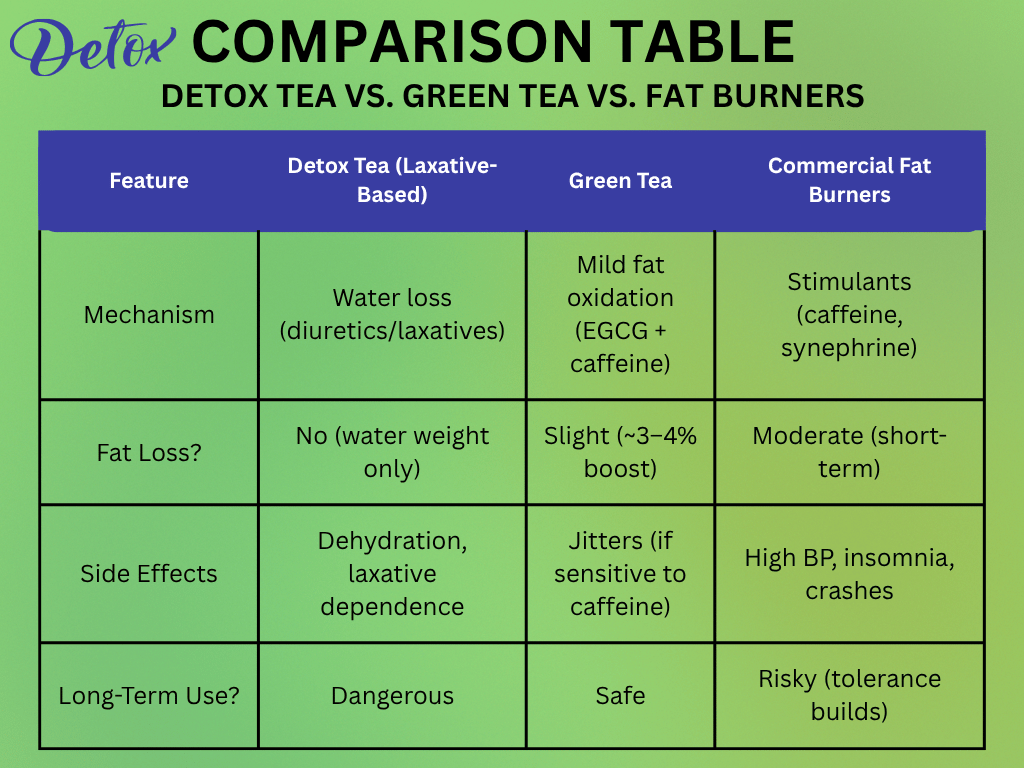
Verdict: Green tea is the safest, most sustainable choice for mild metabolic support.
FAQ: Detox Tea for Weight Loss
1. Does detox tea help you lose belly fat?
No. Detox teas may cause temporary water loss, but they do not target belly fat. Real fat loss requires a calorie deficit, regular strength training, and a balanced diet.
2. How long does it take to see results from detox tea?
If it’s a laxative or diuretic blend, you may experience water weight loss in 1–3 days, but this isn’t an actual fat loss. For sustainable results, focus on long-term habits.
3. Are detox teas safe for daily use?
No. Daily use (especially with senna/laxatives) can lead to dehydration, electrolyte imbalances, and laxative Dependence. Limit to 1–2 times a week, maximum.
4. What’s the best detox tea for weight loss?
Avoid “detox” labelled teas with laxatives. Instead, try:
- Green tea (boosts metabolism)
- Dandelion root (mild diuretic)
- Peppermint/ginger (bloating relief)
5. Can detox tea replace diet and exercise?
Not. Detox teas do not burn enough calories to offset poor eating or inactivity. They’re a supplement, not a solution.




